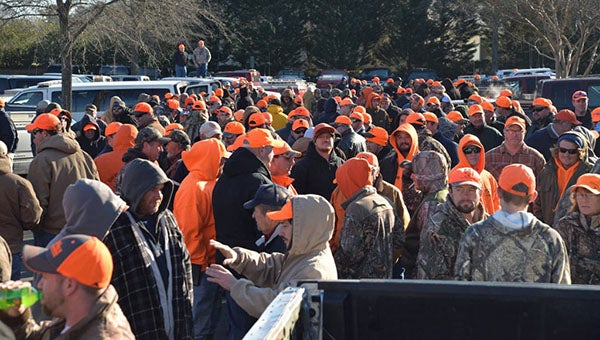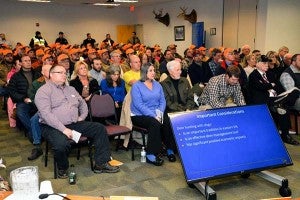Hunters, landowners comment on deer-hunting report
Published 10:25 am Friday, January 22, 2016

In addition to the more than 200 people inside the VDGIF headquarters in Henrico, 200 or so more supporters of hunting with dogs stood outside in the cold due to space restrictions. — SUBMITTED | LEE WALKER – VDGIF
HENRICO
As part of its regularly scheduled monthly meeting, the Virginia Department of Game and Inland Fisheries on Thursday morning publicly revealed its study on deer hunting with dogs. More than 200 men, women and children wearing camouflage gear and blaze orange hats were in the board room to show support for the long-standing tradition of deer-dog hunting, while another 200 or so were forced to brave the cold and stand outside the offices in Henrico — thanks to the county fire code.
“As we can see by the number of folks that are in the room today, folks cherish the outdoors,” VDGIF Communications Director Lee Walker said. “Unfortunately, wildlife doesn’t have a voice. The environment, Mother Nature, doesn’t have a voice. We have to in our jobs and in our passion for the outdoors have to protect and serve that.”

Members of the Virginia Landowners Association, shown without orange hats in the first three rows, showed up more than two hours prior to Thursday’s meeting to secure seats. Pictured, leaning forward, is VLA Executive Director Aaron Bumgarner. — COURTESY | LEE WALKER – VDGIF
VDGIF Chairman Charles Cunningham added, “We owe it to ourselves and our future tradition and our kids’ ability to hunt with or without dogs in the future to help self-police our own community. There’s strong support amongst the general public for hunting, but there’s certain aspects that they don’t know much about, but that they have perceptions about that they do not like. It’s very important that we, as a community, work on changing this.”
The board requested the study in an effort to gain background information on hunting with dogs, the history and laws associated with it and the issues that the different agencies, hunters and landowners have faced.
A summary of the report can be read in the Jan. 13 issue of The Tidewater News, “VDGIF releases deer-dog hunting report.”
VDGIF Vice Chairman Bill Bowling, who made the motion in October for the study to take place, stated at the beginning of the meeting that the board would not take action in regard to the report. He also added the board members had received so many messages and inquiries that they could not respond to them all and, therefore, allowed for public comment during the meeting.
“This is not action item for the board, and because of that, public comment is not required and normally not received on a report like this,” Bowling said. “Because of the degree of the interest, the chairman has decided to do that, and I think it’s a good thing to do to give folks an opportunity to give their views on the report once it’s received.”
Following a brief presentation of the study by Nelson Lafon, deer project coordinator for the Bureau of Wildlife Resources, landowners and deer-dog hunters were allowed to share their stories for a total of 30 minutes each.
“[The people in attendance] came here to express their support for hunting with dogs, for ethical hunting and to express their displeasure with this agency and this board,” said Kirby Burch, chief operating officer for the Virginia Hunting Dog Alliance. “There is no evidence that hunting with dogs has caused serious or wide-spread problems. Anecdotal evidence at times may be compelling, but it’s grossly misleading.”
Burch referenced the report, which stated that the VDGIF received more than 5,400 hunting complains from July 2014 through July 2015, but only 255 involved dogs.
“There are valid complaints, and we need to work together to solve them,” he said. “But complaints are not convictions.”
Stephen Bott, a Southampton County resident, did not defend deer-dog hunters, but instead went after the VLA.
“My message today is intended to demonstrate that the mission of the Virginia Landowners Association is not aimed at property rights, but is an anti-hunting agenda,” Bott said. “VLA members and leadership actively operate or participate in several social media sites that advocate for a total ban on deer dog hunting.”
Each VLA member who spoke disputed this claim and said that they are not against hunting with dogs.
“In a concerted effort to exaggerate dog-related complaints, the VLA has been sending a very clear message to its membership with clear instruction to consistently file complaints,” Bott continued. “They encourage each other to file complaints, even when there isn’t sufficient evidence of a dog-related violation.”
William Hart Gillette, another resident of Southampton County, said that he understands the need for GPS collars to help track the dogs during the hunt. But he also said he doesn’t know why the VLA would attempt to regulate or get rid of hunting with dogs when a majority of its members — if not all of them — were introduced to hunting behind a dog.
“There’s an old saying that when you come to the dance, dance with the one that brung you,” he said. “Don’t shoot the one that got you to the dance … These issues can be resolved with me meeting with the person that has a complaint, and that person meeting me. That’s the way it’s been going on since 1741.”
Meanwhile, members of the VLA told stories of dogs attacking their livestock and free-ranging pets. Among them, Providence Forge landowner Pamela Derby, whose Letter to the Editor, “Landowners standing with VLA to protect property rights,” can be found in the Friday, Jan. 15, edition of The Tidewater News.
“I have 16 chickens, guineas and a duck that I raise for eggs,” she said, explaining an incident that allegedly occurred on Dec. 12. “I saw large hunting dog with an orange antenna running through my yard into my forest with my chicken in its mouth. I couldn’t grab my camera or my gun. The dog was gone. I hobbled out to investigate the damage, and I found two other mounds of feathers where other chickens had been assaulted. When dusk came and the chickens came to roost, four chickens were missing.”
Derby said that she found the chickens the next day on neighboring properties, and that they were either heavily wounded or paralyzed.
“I moved because I wanted to live in the country,” she said. “I’ve been confronted with the argument that my property is not really my property, and that dogs and hunters can come and go as they please. I was told that I have no recourse because I wasn’t able to get a photo of the hunting dog on my property with my chicken in its mouth … To allow hunting dogs to trespass and kill and then blame me for moving to the country or for free-ranging my birds on my land is wrong. A hunting dog’s rights to my property should not supersede my rights to my property.”
Others VLA members, like Ricky Tetterton, said that the statistics presented in the study should not be ignored because it is only a small percentage of complaints that involve dog hunting.
“It’s my understanding that laws are there to respect the opinion of the majority, but to protect the minority,” Tetterton said. “Just because rape, murder, robbery and other crimes are not a major portion of the population does not mean that we don’t have laws in the books to protect against it … [Camaraderie] exists with [the hunters in the room], but we also have some bad apples out there. We have some people with bad intentions, and that law can be abused.”
Bumgarner, who has led the VLA’s push for a dog permit system that would require mandatory registration of clubs or individuals planning to hunt deer with dogs, was the last person to speak on behalf of his organization.
“We wouldn’t be here if it was an occasional dog or two,” Bumgarner said. “What we are looking for is a solution to hold those causing problems accountable without affecting those who do not have problems … This is the single and most serious threat to deer-dog hunting in Virginia and my home state of North Carolina, where I was raised deer-dog hunting … There is no effort on the part of the VLA to ban dog hunting, but we do recognize that the greatest risk is not fixing the problem.” In an interview with Bumgarner conducted by The Tidewater News for the story “Landowners, dog hunters square off” (Sunday, Jan. 3, 2016), when asked of any specific incidents with deer hounds or nearby hunt clubs had influenced him to pursue this agenda, he declined to comment.
Additionally, members without affiliation to either the VDHA or VLA were asked to speak, including 15-year-old Preston Sutton of Cumberland. He skipped school on Thursday to voice his opinion.
“I hope this great tradition is not brought to an end,” Sutton said. “I want my children to experience the fun and responsibility provided by these hounds. Dog running is not just a hobby, it’s a way of life.”
The nearly three-hour meeting concluded with Bowling reminding those in attendance that this year is not one in which the board has the authority to change or add any regulations, as it occurs every other year. This year, the board will assess regulations on fishing.
“I really appreciate the comments on both sides,” he said. “We’ve received some good feedback and thoughts that the board will further have to reflect upon as we go about considering our revision of hunting regulations in 2017 and if there is anything [said today] that will be included.”





